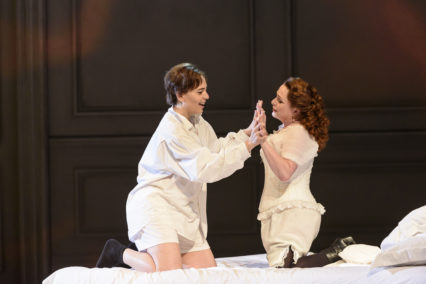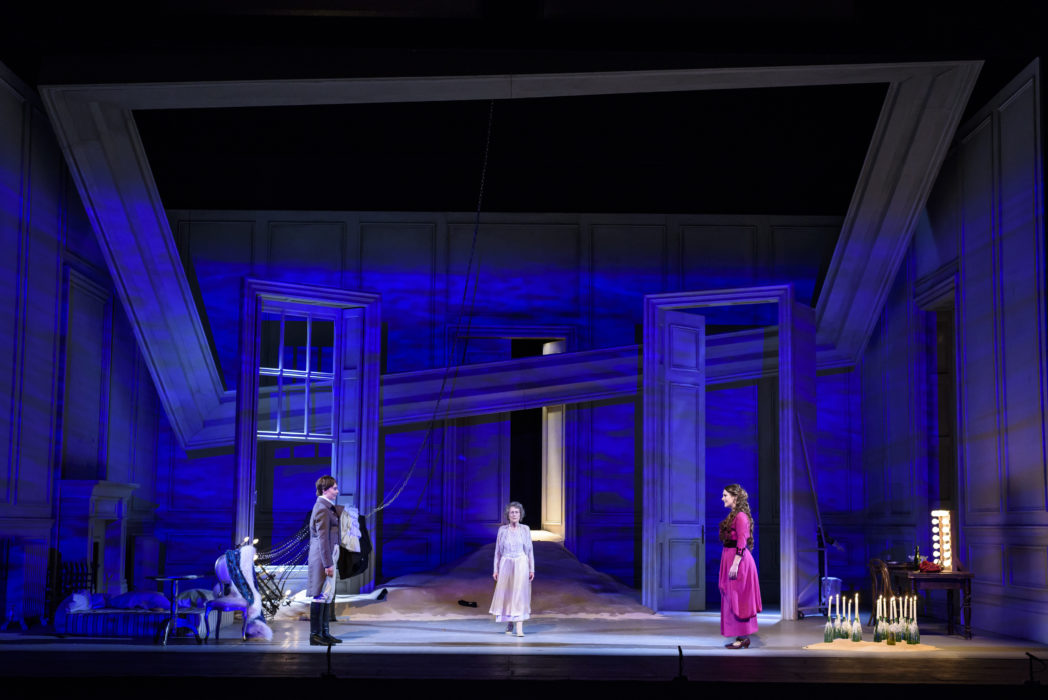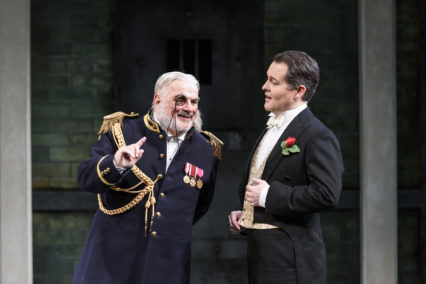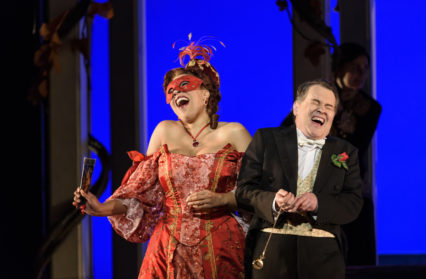Wales Millennium Centre, Cardiff, June 4 and 7, 2017
Welsh National Opera
Richard Strauss: Der Rosenkavalier (new production)
Johann Strauss II: Die Fledermaus (revival)
Less than forty years separate Johann Strauss’s Die Fledermaus (1874) from Richard Strauss’s Der Rosenkavalier (1911). Neither has much that is obvious to say about disturbances beneath their surface depictions of Viennese love, life, and manners. The two are paired by WNO in its summer season to illustrate the theme of contemporary vice in that city, though ‘vice’ is perhaps too strong a word to describe the earlier operetta’s manic frivolity and the latter opera’s self-regarding melancholia. As part of WNO’s intention to theme each of its seasons under artistic director David Pountney, however, the match is inspired.
Today’s directors look at opera for its relevance to today’s operagoers, the danger in updating the mise-en-scène to somewhere less remote in experience being at best enlightening and at worst patronising. The cascades of sand to symbolise time passing in Olivia Fuchs’s otherwise pleasing production of Der Rosenkavalier are condescending and tiresome. Fuchs does overlay the backdrops at times with Great War video footage, which at least compensate for explosions literal and metaphoric. Rebecca Evans, singing her first Marschallin, is shadowed in a Fuchs device by her older and more frail self, played by former WNO chorus member Margaret Baiton. Sometimes it works, sometimes not, and on balance seems almost superfluous.

That said, historical hindsight can be a gift for directors, especially when dealing with works that do not overtly suggest trouble beneath the surface. The undercurrents in Der Rosenkavalier are less to do with impending disaster than the societal changes that led up to it, paticularly those to do with political economy. They are exemplified by Adrian Clarke’s upwardly mobile and nouveau riche von Faninal, ever conscious to preserve the mobility and its trajectory. Evans’s steadfast vocal line as much as its purity makes for haughtiness of manner as well as the draining of allure conditioned by ageing, and together they make the character interesting as a statement about the consequences of self-absorption.
Modern sensibilities might be more attracted to the spirited Sophie of Louise Alder even less than to Lucia Cervoni’s meaningfully sung but rather stiff Octavian. But it’s the Baron Ochs of Brindley Sherratt, as powerful in its sustained attempt to re-order wealth as it is relentless in its lechery, that remains in this production the potent force. It is emasculated only by Strauss’s compassionate writing for the female voices, the final melting trio and its simultaneous flowering of renunciation, gratitude, and ecstasy, here sung with distinction. In Der Rosenkavalier, Strauss looks over his shoulder at changes and fissures in Viennese society as well as at universals – his Marschallin is emotionally kin to the Countess in Mozart’s The Marriage of Figaro – and with musical means already unleashed in his operas Salome and Elektra but here mainly fur-coated, apart from that initial gush.

Only nine years came between the previous WNO production of Die Fledermaus in 2002 by the Catalan director Calixto Bieito, widely seen as a travesty, and the latest six years ago by John Copley, essentially a ‘hands-off’ version. Copley’s is revived for 2017. Die Fledermaus is almost surreal in the seriousness of its complexity; and it’s valid to look on that as a means of blotting out realities soon to be addressed in Vienna by Freud and others. Copley was blessed in 2011 with a fine cast, including the Welsh Shakespearian Desmond Barrit in the half-extemporised role of the gaoler Frosch. Merthyr’s Steve Speirs plays the non-singing part this time around, with some pre-election gags to do with ‘cell No.10’ and others at the expense of WNO’s new music director, Tomáš Hanus, who took it all in good part as well as conducting both operas with elegance and sparkle uncorrupted by excess of either.

Copley will also be pleased with how WNO’s revival director Sarah Crisp has brought his conception to life again. Among the principals, only Paul Charles Clarke as the Italian tenor Alfred, Alan Opie as Colonel Frank and Mark Stone as Eisenstein are retained from the original. Clarke’s a hoot, combining with the majestic Rosalinde of Mary-Elizabeth Williams in hammed-up quotes from grander opera. Williams’s robust voice seems to have wandered in from Verdiland but coincidentally adds distaff authority to a character nonetheless unlikely to be the victim of deceit for long. The Csardas, her party-piece and nostalgic counterpart of the Merry Widow’s Vilja, hypnotises a chorus otherwise portrayed and performed as inveterate party animals. In a story of inspired absurdity, Ben McAteer’s Dr Falke reveals himself as revenge comically personified in the form of a furry pantomime bat.
Carleen Ebbs stepped in as Adele for the indisposed Rhian Lois on this second outing, and her light, almost delicate, soprano fluttered into place nicely. Emma Carrington as Orlofsky delivers her Champagne Song without a telling strain of world-weariness sometimes associated with the part. The production gets everything right, from Deirdre Clancy’s gorgeous outfits, Tim Reed’s stylish sets, and the discreet but bright delineations of lighting designer Howard Harrison, to Copley’s perfectly judged taking of liberties with a work whose hedonistic whoosh encourages even the wheeling on of a plattered hog’s head with a Donald Trump barnet. It’s a small measure of how appropriate is the parcelling together of these two operas that Clarke also plays the Italian Singer in Der Rosenkavalier, where the opportunities for hilarious over-reaching are unavailable but the Marschallin’s levée of which he is part is as madcap as the goings-on in Die Fledermaus. In Fuchs’s production, the intriguers Valzacchi (Peter Van Hulle) and Annina (Madeleine Shaw) resemble expressionist creatures from some future already twisted beyond recognition – it’s the future of the characters from both operas.
All that detonates in Die Fledermaus are popped corks from bottles of champagne, the only guide to its success being an imagined Frothometer. Perhaps we should be thankful that Copley didn’t portray events as a cocaine-fuelled disco party organised by the super-rich; but no doubt it’s on some director’s list of possibilities. As the happenings of Die Fledermaus cloud and obscure its wobbly dramatic structure, so the lather of champagne cascades around the glass – a glass already marked with hitherto invisible cracks. By the end of the century, they were beginning to show, for those bothered to look.
Header: Mary-Elizabeth Williams as Rosalinde and Mark Stone as Eisenstein in Die Fledermaus
All photographs by Bill Cooper



 Enjoyed this article? Support our writers directly by buying them a coffee and clicking this link.
Enjoyed this article? Support our writers directly by buying them a coffee and clicking this link.







